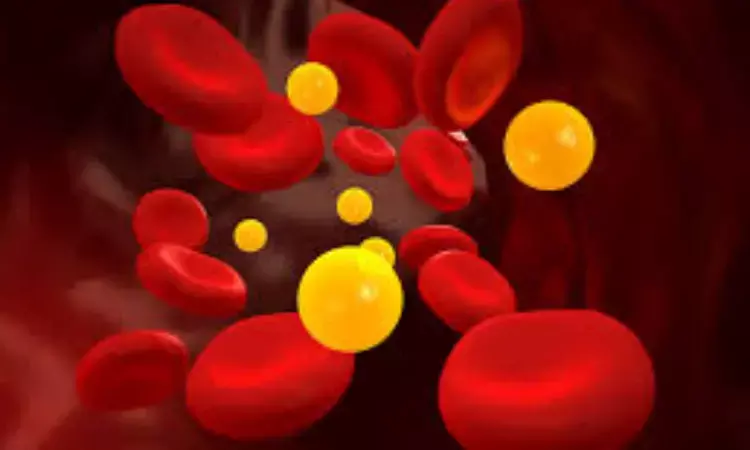- Home
- Medical news & Guidelines
- Anesthesiology
- Cardiology and CTVS
- Critical Care
- Dentistry
- Dermatology
- Diabetes and Endocrinology
- ENT
- Gastroenterology
- Medicine
- Nephrology
- Neurology
- Obstretics-Gynaecology
- Oncology
- Ophthalmology
- Orthopaedics
- Pediatrics-Neonatology
- Psychiatry
- Pulmonology
- Radiology
- Surgery
- Urology
- Laboratory Medicine
- Diet
- Nursing
- Paramedical
- Physiotherapy
- Health news
- Fact Check
- Bone Health Fact Check
- Brain Health Fact Check
- Cancer Related Fact Check
- Child Care Fact Check
- Dental and oral health fact check
- Diabetes and metabolic health fact check
- Diet and Nutrition Fact Check
- Eye and ENT Care Fact Check
- Fitness fact check
- Gut health fact check
- Heart health fact check
- Kidney health fact check
- Medical education fact check
- Men's health fact check
- Respiratory fact check
- Skin and hair care fact check
- Vaccine and Immunization fact check
- Women's health fact check
- AYUSH
- State News
- Andaman and Nicobar Islands
- Andhra Pradesh
- Arunachal Pradesh
- Assam
- Bihar
- Chandigarh
- Chattisgarh
- Dadra and Nagar Haveli
- Daman and Diu
- Delhi
- Goa
- Gujarat
- Haryana
- Himachal Pradesh
- Jammu & Kashmir
- Jharkhand
- Karnataka
- Kerala
- Ladakh
- Lakshadweep
- Madhya Pradesh
- Maharashtra
- Manipur
- Meghalaya
- Mizoram
- Nagaland
- Odisha
- Puducherry
- Punjab
- Rajasthan
- Sikkim
- Tamil Nadu
- Telangana
- Tripura
- Uttar Pradesh
- Uttrakhand
- West Bengal
- Medical Education
- Industry
Long-term lipoprotein apheresis promising in reducing CV events in high-risk patients with isolated Lp (a) elevation: Study

Germany: In a significant breakthrough for high-risk cardiovascular patients with isolated lipoprotein(a) elevation, a pioneering study has unveiled the efficacy of long-term lipoprotein apheresis (LA) in reducing cardiovascular events. The study, published in the Journal of Clinical Lipidology, offers new hope for individuals grappling with elevated lipoprotein(a) levels, a major risk factor for cardiovascular disease (CVD).
In the study of 25 individuals with isolated lipoprotein (a) elevation, the findings suggest lipoprotein apheresis was associated with reductions in median Lp(a), cardiovascular (CV) events, and mean LDL-C among patients with an indication for the treatment.
"We recommend lipoprotein apheresis for patients with high Lp(a) who still have CV events despite optimal lipid-lowering medication and lifestyle changes," the researchers wrote.
Lipoprotein(a), or Lp(a), is a cholesterol-rich particle linked to an increased risk of heart attacks, strokes, and other cardiovascular events. Despite its well-established role in cardiovascular health, effective treatment options for individuals with elevated Lp(a) levels have remained limited until now.
Friederike Schumann, Charité – Universitätsmedizin Berlin, Germany, and colleagues report long-term experience with LA and its effectiveness in reducing CVD events in patients with elevated Lp(a).
For this purpose, the researchers conducted a retrospective open-label, single-center study of 25 individuals with Lp(a) elevation >60 mg/dL and LDL-C < 2.59 mmol/L who indicated lipoprotein apheresis. The study's primary endpoint was the incidence of any CV event (determined by medical records) after LA initiation.
The following were the key findings of the study:
· Mean LA treatment duration was 7.1 years. Median Lp(a) was reduced from 95.0 to 31.1 mg/dL after LA (-67.3 %).
· Mean LDL-C was reduced from 1.85 to 0.76 mmol/L after LA (-58.9 %).
· Before LA, 81 CV events occurred (0.87 events/patient/year). During LA, 49 CV events occurred in total (0.24 events/patient/year; -0.63).
· Yearly major adverse cardiac event (MACE) rate was reduced from 0.34 to 0.006.
· Similar results were obtained when considering only individuals with baseline LDL-C below 1.42 mmol/L.
The long-term observation indicated that patients receiving lipoprotein apheresis for elevated Lp(a) exhibited a lower rate of CV events after the therapy initiation than their pre-therapy status.
The researchers note that as an observational study, it does not establish a causal relationship between lipoprotein apheresis and the reduction in cardiovascular event rates. Rather, these results suggest a correlation that warrants further investigation.
"Even as new therapies emerge, lipoprotein apheresis continues to serve as a valuable alternative treatment for patients who fail to achieve lipid goals despite undergoing maximum lipid-lowering therapy or those who experience intolerance to lipid-lowering drugs," they concluded.
Reference:
Schumann F, Kassner U, Spira D, et al. Long-term lipoprotein apheresis reduces cardiovascular events in high-risk patients with isolated lipoprotein(a) elevation. Journal of Clinical Lipidology. Published online April 27, 2024. doi:10.1016/j.jacl.2024.04.134.
Dr Kamal Kant Kohli-MBBS, DTCD- a chest specialist with more than 30 years of practice and a flair for writing clinical articles, Dr Kamal Kant Kohli joined Medical Dialogues as a Chief Editor of Medical News. Besides writing articles, as an editor, he proofreads and verifies all the medical content published on Medical Dialogues including those coming from journals, studies,medical conferences,guidelines etc. Email: drkohli@medicaldialogues.in. Contact no. 011-43720751


